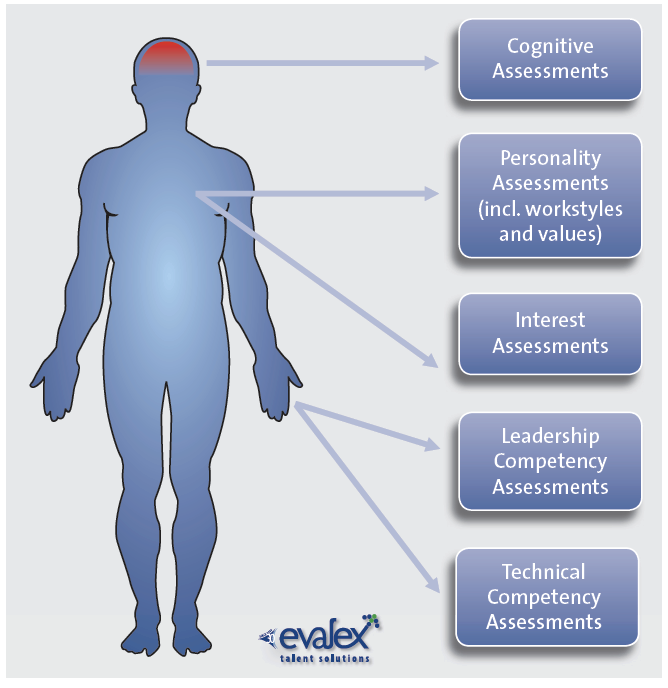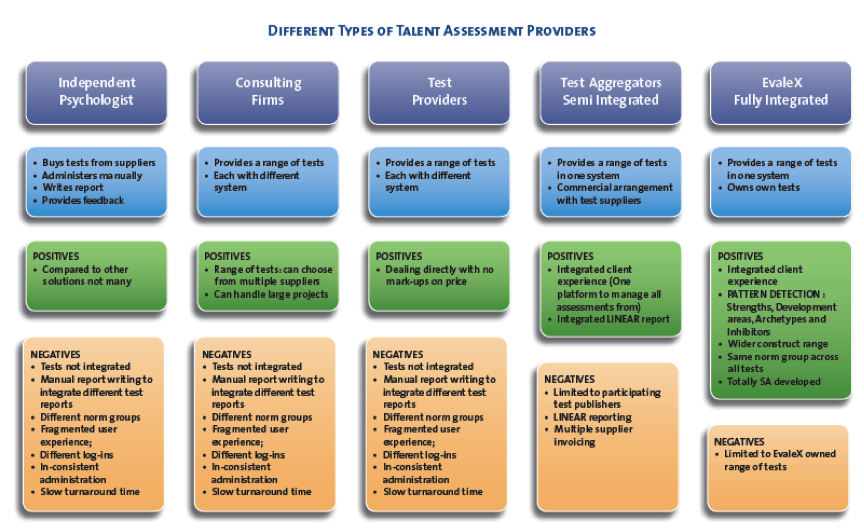Overview of the Assessment Landscape
For a talent assessment client or practitioner it is important to have access to information about the talent assessment landscape when selecting a solution for your company or practice
The talent landscape can be considered from a number of angles. Firstly, the types of tests available; secondly, the different systems; and thirdly, the current providers.
Talent Assessment Types
The first thing any would-be user of talent assessments should be aware of is the range of constructs that can be assessed. Often the issue of talent and what it is, can be underestimated and over-simplified. In pursuit of ever shorter assessment times and simple models that are easier to explain to line managers, companies often come up with almost unethical solutions.
 Evalex research into the dimensions that drive individual performance, career success, high performance teams and high performance companies, indicates that a wide holistic approach should be taken and therefore a wide range of tests needs to be included in any assessment battery.
Evalex research into the dimensions that drive individual performance, career success, high performance teams and high performance companies, indicates that a wide holistic approach should be taken and therefore a wide range of tests needs to be included in any assessment battery.
Unlike other companies, Evalex does not use a simplistic “one-construct” test to make decisions about promotions or appointments. Other companies may not be aware of it, but should a candidate that has been declined on this basis take them on in a labour dispute, they could be in trouble. Be aware of test suppliers selling you a “one-test-solves-all” solution. Often these tests only measure personality or styles, which shows some correlation with performance but far less than a holistic test battery.
The diagram on the left indicates the various constructs that make up human functioning. It is important to ensure that an assessment solution comprises a cognitive test, a personality or styles test, an interest questionnaire and a competence test such as assessment centre simulations or technical assessments.
Talent Assessment Systems
Most systems come packaged with an assessment instrument. This can range from a manual process (no integration) of handing out test books and answer sheets, to logging into a website to do a test (semi-integrated), or logging into a talent system where a number of tests are completed on one platform (fully integrated).
For a proper overview of the distribution systems used to facilitate assessments, the total assessment value chain must be considered. We believe the value chain consists of the following process events:
- Design philosophy of the assessment tool
- Test choice in setting up the assessment
- Facilitation of the actual assessment
- Assessment scoring and norming
- Assessment reporting
- Feedback to decision maker and candidate
- Invoicing and billing administration
The ultimate system would manage these seven “moments of truth” in the value chain through a well-designed, integrated system.
The question is, which systems do this?
We have scanned the market and found that most companies’ assessment practices fall essentially into three models. :
1. Manual and semi manual (no integration): This involves administering a number of tests – some manual and some automated – characterised by logging into different systems.
Advantage:
• Easy for any consulting psychologist or in-house assessment function to set up
Negatives:
- Slow turnaround time and high cost of process
- Inconsistent design philosophies
- Labour intensive administration
- Site bound administration
- Frustrating and fragmented user experience, having to log into different test procedures
- Final integration of different test reports into one integrated report is labour intensive and highly dependent on the competence and experience of the psychologist
- Billing administration is convoluted and inefficient; each candidate’s assessment has to be matched to different supplier invoices and credits
2. Test aggregators (semi-integrated): Test aggregators have developed a computer system that aggregates a number of supplier tools, leading to one platform for administration.
Advantages:
- Three points of integration: One assessment experience for candidate, one linear report and one integrated feedback session
- Lower cost of process
- Faster turnaround time
Negatives:
- Incoherent design philosophies: As each test in the system may have been developed by a different test publisher, the design philosophies and psychological theories differ
- Inconsistent scoring and norming: Each test is standardised according to its own norm or population group. So the scores on dimensions have all been compared to different norm groups leading to inconsistent norming of talent levels
- Linear reporting: The report lists dimension performance in a linear fashion with little pattern detection
- Billing administration is slightly better than the manual/semi-manual process, but still convoluted
3. Evalex (fully integrated): At Evalex we have developed our own assessment platform AND our own psychometrics.
Advantages:
- Six points of integration
- One design philosophy across all tests
- Assessment instruments cover a full range of human constructs: Few suppliers offer value questionnaires, interest assessments, technical competency assessments and assessment centres (management simulations) in addition to the normal cognitive and personality battery
- System generated pattern detection report: A good psychologist will detect patterns; a high scoring dimension in one test linking to a low scoring dimension in a second test linking with another high scoring dimension in a third test indicates a pattern that could be interpreted as a strength or development area. The Evalex software has been programmed to detect patterns for:
- 1. Strengths
- 2. Development areas
- 3. 48 performance inhibitors
- 4. 17 archetypical roles in organisations and how the candidate matches them
- Quality control: Our sophisticated reporting engine ensures that all patterns are detected; quality becomes system guaranteed rather than dependent on the psychologist’s skill
Talent Assessment Providers
Assessment instruments are provided by a range of practitioners. Four types have been identified, including independent psychologists, test suppliers, large consulting firms, test aggregators and fully integrated solutions.
The chart below indicates the business model of each, with the associated advantages and disadvantages.

The choice is entirely up to the client and all four models provide solutions. For small companies that do not employ their own psychometrist or psychologist, the independent psychologist can work well by providing expertise on an ad hoc basis.
Assessment firms such as large auditing and consulting companies will be more suited to larger companies, where volume and throughput are critical. Test providers are useful where a particular range of tests need to be sourced for a project.
The market is, however, definitely moving towards talent assessment system providers (test aggregators) simply for ease of use and lower cost of process. Many test providers are now working with system providers who offer tests through their systems.
When it comes to talent system providers, it makes sense to use the most integrated system.